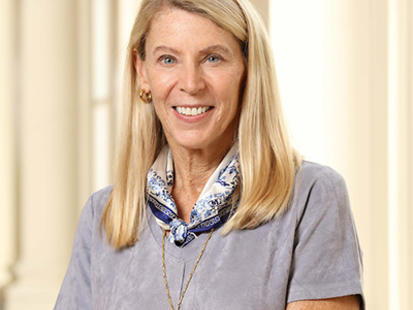
Carolyn Miles
MBA '88, John Alden Purinton, Jr. Professor of Practice
Industry
Career-wise, Carolyn Miles (MBA ’88) has seemingly done it all. She’s worked in corporate America for a Fortune 500 company, been an entrepreneur overseas, taught in higher education, and served as CEO for a global NGO.
Now, she’s back in Charlottesville, having completed a term as the Interim President of the Darden School Foundation, and continuing to serve as the John Alden Purinton Jr. Professor of Practice and senior adviser to the dean helping the school implement its ambitious 2030 sustainability goals.
To Miles, “sustainability” is a holistic concept. It spans beyond environmental policies to encompasses equity and justice, economics, health and education—a whole ecosystem that aims to balance the interests of people and the planet as thoughtfully as possible. Miles says she developed this perspective during her two-decade career at Save the Children, an NGO with a nearly $3 billion budget for global programming supporting families and children.
“My work at Save the Children highlighted for me the significant impact that sustainability concerns—particularly around climate change and growing inequality gaps—profoundly impact the poorest among us,” she says. Worldwide, the poorest people contribute the least to climate change, but are the most vulnerable to harm—whether in extreme weather, sea level rise and/or scarcity of natural resources. In addition, when disaster strikes, the poorest communities have the fewest resources for recovery and are most likely to suffer long-term social disruption.
Miles believes that institutions like Darden have a key role to play in readying leaders to think about how to share resources equitably, mitigate climate change, and increase global resilience.
“When I decided to come back to Darden, I’d been working with Bayer AG [as a sustainability council member] and could see sustainability starting to infiltrate their work in a big way,” she says. “I saw the need at Darden for a general course on sustainability for students who would not be specializing in environmental work, but who would be going into marketing, finance, compliance and other roles.” Today, every part of an organization needs to contribute to business continuity plans and have thoughtful strategies on social, political, and environmental issues, she notes.
To meet this need, Miles developed “Managing Sustainability from the Inside Out,” a second-year elective where students develop sustainability strategies for large businesses. Among other tasks, they identify areas where the organization has the most leverage to make real change.“With sustainability work, it’s so easy to get paralyzed and overwhelmed. The questions ‘where to start?’ and ‘what to focus on?’ are critical,” Miles says.
She cites as an example Save the Children, which two decades ago identified infant mortality as a place where simple, effective solutions could be deployed at scale. Through a focus on community health partnerships, Save the Children, along with many others, was able to reduce the number of children under age five dying from preventable illness by more than 50 percent worldwide over 20 years.
Because it made so much progress on infant mortality, Save the Children has been able to pivot in some countries and address other kinds of welfare. “In Ethiopia, which once had some of the highest infant death rates, we don’t work infant mortality anymore because we don’t have to,” Miles says. Save the Children now focuses on economic development in Ethiopia, training young women as small business owners. “Some of whom are probably people we saved as kids 20 years ago,” Miles reflects. “Now we’re helping them make a living.”
Today, Miles is working on scaling something different: Darden’s sustainability goals. The school’s 2030 initiative aims to transform “how we live” and “how we learn.” Planned actions range from reducing landfill waste and eliminating fossil fuel use, to weaving sustainability into the first-year core curriculum and increasing the number of related courses, research articles, and case studies on offer. Darden also recently launched a sustainability concentration within the MBA degree.
Lots of change afoot, but Miles emphasizes the core of what Darden teaches—leadership, vision, and managing and motivating people—remains just as relevant today as when she graduated 35 years ago.
“Relationship skills are a hallmark of a Darden degree. It’s how you motivate people, how you inspire them,” she says. “Working alone, I’m never going to get that much done because I’m one person. But once you understand how to develop a vision and motivate others towards it, you multiply your impact many times over.”